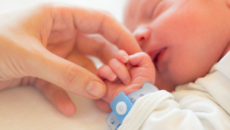With forethought and planning, the stress for a newly adopted child subjected to surgery and anesthesia can be kept to a minimum. There are several unique factors to consider when scheduling surgery for an internationally adopted child. Most surgical procedures in young children require a general anesthetic, and modern pediatric anesthesiology is generally safe. But a family history of anesthetic problems will be difficult if not impossible to obtain. Also, the child’s initial medical, developmental, and laboratory evaluation will take several weeks to complete after he arrives in America. Most health care workers in a surgical setting would want to know if the child was positive for active Hepatitis, HIV, or TB. The child may be frightened of medical settings and personnel, as medical contacts in his home country usually meant shots, blood draws, or worse. Finally, surgical procedures usually mean separation, at least for a time, from the adoptive family. This may be traumatic for a newly adopted child who is working at attachment.
The timing of elective surgery is an important issue for new adoptive families. It is generally accepted that general anesthesia is safer after a child passes his first birthday. In addition, it seems reasonable to delay elective surgery in young children (under two years) until they have been in their adoptive homes for four to six months. This time will allow parent and child to become attached and familiar with each other, prior to separation, post-operative pain, and repeated contact with doctors.
Of course, these family-bonding considerations must be considered in the context of the child’s medical needs. Excessively delaying an elective but necessary procedure may put the child at risk for long-term consequences in health and development. For example, there may be an immediate need for ear tubes to drain fluids. This will allow a child to hear better and acquire language more quickly. In any event, it’s a good idea for parents to “room in” throughout a child’s hospital stay.
For older children, waiting before elective surgery will allow more time for acquisition of English. This will enable the child to better understand the nature of his surgery. If time is an issue, be sure that the hospital provides an interpreter to explain the procedure.
It’s best to work with health care providers who are sensitive to the issues of international adoption and the special psychological needs of these children. Other adoptive families can also provide advice as to the timing of elective procedures and offer suggestions for coping with the experience.



